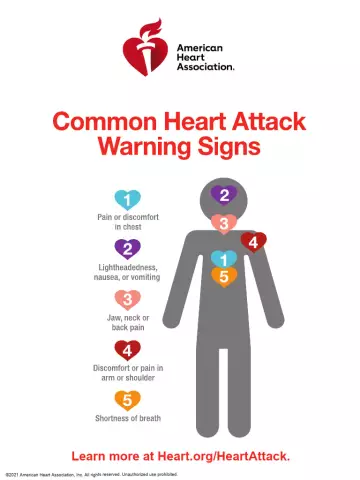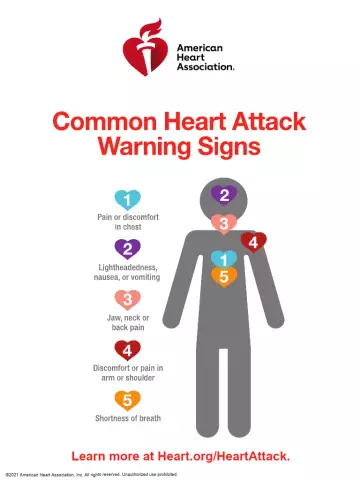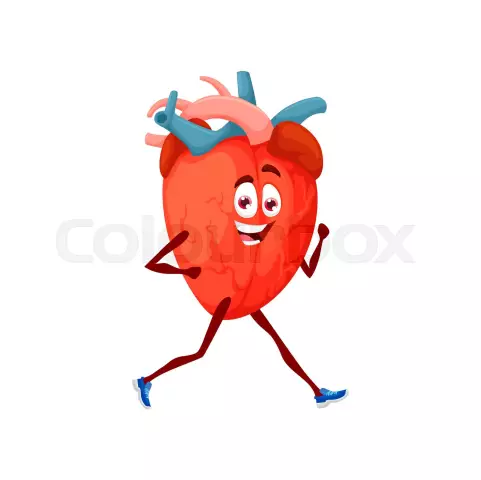- Author Rachel Wainwright wainwright@abchealthonline.com.
- Public 2023-12-15 07:39.
- Last modified 2025-11-02 20:14.
5 signs of an impending heart attack
About 4.5 million inhabitants of the Earth (or 48% of all deaths) become victims of myocardial infarction every year. Especially unpleasant is the fact that the disease is steadily getting younger: the majority of men who die from it are between the ages of 30 and 50. Risk factors for the development of the disease are heredity burdened by cardiac pathology, a sedentary lifestyle, the presence of bad habits, obesity, diabetes mellitus, hypertension, exposure to stress. In women who have reached the age of menopause, the risk of developing myocardial infarction increases with hormonal changes.
Many people believe that since a heart attack develops suddenly, it is impossible to prevent misfortune. This is not true. Signs of an impending heart attack can be noticed in a few weeks or even months. We suggest that you familiarize yourself with the symptoms that in no case should be ignored.
Dyspnea
Myocardial infarction is an acute manifestation of ischemic heart disease. This condition does not appear suddenly, it develops over a long time. With a heart attack, the blood supply not only to the heart is disrupted, but also to other organs and tissues. The lungs also begin to work worse than before, the process of their ventilation becomes more difficult. Malfunctions of the respiratory system are manifested by shortness of breath, which torments a person even with minor exertion. If you find it difficult to catch your breath after climbing one flight of stairs or a slight acceleration in walking, see your doctor immediately.

Source: depositphotos.com
Symptoms that resemble those of a cold
Disturbances in the blood supply weaken the body, making it extremely susceptible to infection. It has been established that in the period preceding the development of myocardial infarction, patients often catch colds. In addition, insufficient ventilation of the lungs causes phenomena similar to those inherent in the initial stage of ARVI. The patient feels a sore throat, constantly clears his throat. In some patients, body temperature rises for a short time. When a heart attack is approaching, a condition similar to a sluggish cold can persist for several months.

Source: depositphotos.com
Chest pain
There is an opinion: myocardial infarction is always accompanied by such severe pain that it is simply impossible not to notice its approach. It's a delusion. Many people (especially young men) are able to ignore extremely dangerous signs for weeks: a feeling of squeezing in the chest or pain in the left side of the chest, radiating to the arm and shoulder. The fact is that the intensity of such sensations is not very high. They occur with fatigue or stress, but soon go away on their own.
It is important to understand that any chest pain indicates a heart problem. Ignoring her and postponing a visit to the doctor is unacceptable.

Source: depositphotos.com
Fatigue
Deterioration of the cardiovascular system affects the entire body. Signs of an approaching myocardial infarction can be rapid fatigue, lethargy, drowsiness, inability to concentrate. The danger is that such complaints are made by almost all people doing strenuous and responsible work. Fatigue becomes habitual, and the person simply does not have time to notice that the unpleasant symptoms have intensified.
You should be careful about your condition if you can't get enough sleep for weeks, rest on weekends, and even vacation does not bring noticeable relief. Signs such as daytime sleepiness combined with disturbed night sleep should also cause concern.

Source: depositphotos.com
Dizziness
When blood circulation is disturbed, the brain is the first to suffer. One of the main signs of oxygen starvation is frequent dizziness. They can occur against the background of overwork, stress, with sharp bends and turns of the head.

Source: depositphotos.com
If you have risk factors for the development of myocardial infarction, you are engaged in difficult and nervous work and have reached a dangerous age (about 40 years for men and 50 years for women), take as much attention as possible to the usual ailments. At first glance, harmless sensations (dizziness, fatigue, shortness of breath, etc.) can be harbingers of a formidable illness.
YouTube video related to the article:

Maria Kulkes Medical journalist About the author
Education: First Moscow State Medical University named after I. M. Sechenov, specialty "General Medicine".
Found a mistake in the text? Select it and press Ctrl + Enter.






